If you’re an e-commerce store looking to grow your sales, you must get serious about pop-ups.

Contrary to popular belief, pop-ups don’t have to be annoying. Executed correctly, they have the power to make a big difference in your conversions. It all goes down to segmenting them correctly and making them relevant to your visitor.
Today, we will look at the seven best pop-up tools you can use to take your conversion to new heights. Let’s get started:
1. Privy
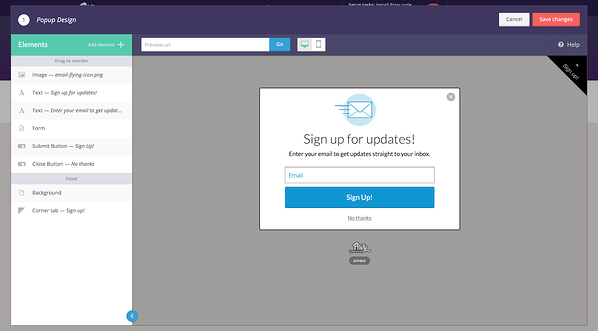
Privy grows your sales with exit-intent popups, flyouts, announcement bars, and more. It’s a valuable tool if you’re looking to increase your email list and reduce cart abandonment.
The easy-to-use program makes it easy to experiment and tweak your email popups. You can test different messages based on color, design, display time, and more to see what works the best, even with no coding skills.
Another area where Privy excels is segmentation. To make your popups relevant to the visitor, you can segment them based on which country they come from, how they landed on your website, how much they have in their shopping cart, etc.
Pros:
- A/B testing feature for the best results
- Customizable pop-ups to make sure you send the right message at the right time
- Creates beautiful newsletters
- Reduces your cart abandonment rate
Cons:
- Limited templates
- A/B and advanced reporting are only available on premium plans
Pricing:
- Free plan: up to 5000 average monthly page views
- Privy Convert: $20/month for up to 10,000 average monthly page views
- Privy email: $10/month for up to 1000 mailable contacts and $5 per additional 1000 afterward.
- Privy text: $10/month for up to 100 textable contacts and $10 per additional 100 afterward.
2. Sumo
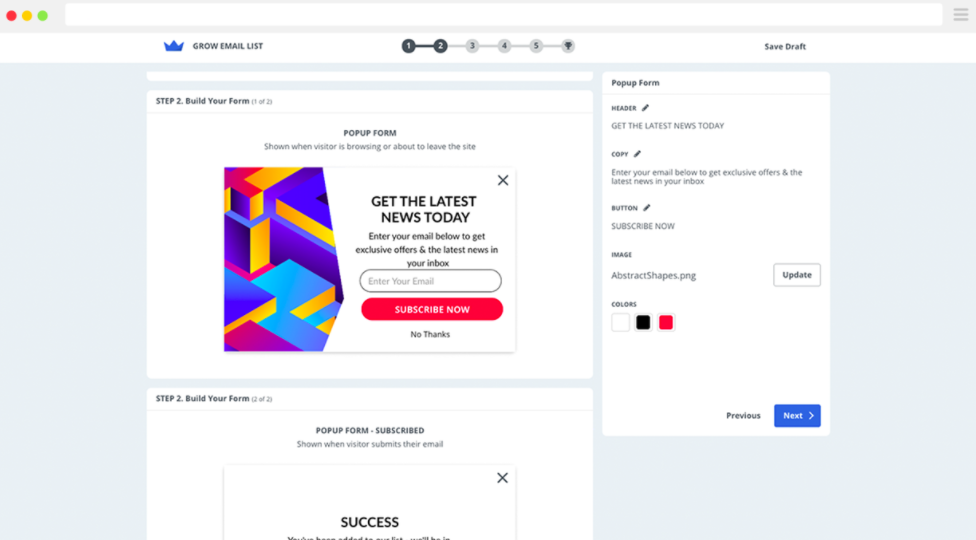
Sumo is a top-rated conversion tool trusted by over 600,000 businesses worldwide. The platform includes multiple features to help stores win more sales, generate conversions, and increase subscribers.
From the platform admin, you can create unique offers and discounts to get your customers’ attention. By making customers sign up, you’ll increase your store’s average order value and boost sales.
Just as shoppers are about to leave their cart, Sumo reaches out with a popup that encourages them to follow through with their purchase. It also retargets customers with a follow-up email when subscribers view your product without buying.
Pros:
- Easy-to-read guides on how to use the app
- Free customer support
- A/B testing
Cons:
- The sumo logo shows up on your popups when you’re on the free plan
- Limited integrations
- Can’t send emails to individual subscribers, only in groups
Pricing:
- Free plan: up to 10,000 emails/month
- Pro plan: $49/month for up to unlimited emails
3. Justuno Pop Ups
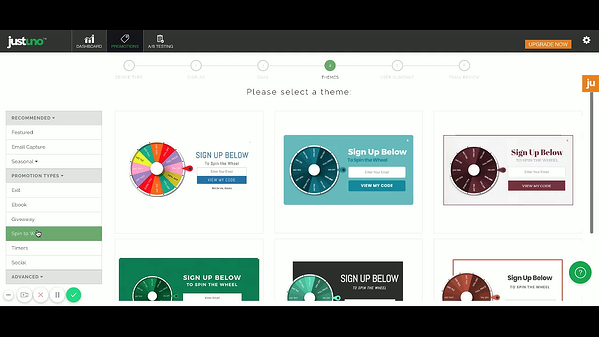
Justuno uses artificial intelligence to boost conversions with pop-ups, exit offers, countdown timers, and more. It offers endless ways to customize your upsell and cross-sell offers.
The platform’s AI software analyzes billions of data points to tailor pop-ups based on each visitor. It tracks visit frequency, geolocation, cart value, and more to ensure your store sends the right message at the right time.
Justuno comes with advanced analytics to track your marketing success and measure performance. You’ll gain exact insights into what strategies work and what don’t.
Pros:
- Artificial intelligence to help you get the best results
- Mobile and SEO optimization
- Upselling and cross-selling features
- A vast library of resources to help you out
Cons:
- Limited design and templates
Pricing:
- Free plan: all standard features are available for up to 5,000 monthly visitor sessions.
- Pro plan 1: $29/month with all features available up to 10,000 monthly visitor sessions.
- Pro plan 2: $49/month with all features available up to 25,000 monthly visitor sessions.
- Pro plan 3: $99/month with all features available up to 50,000 monthly visitor sessions.
4. Omnisend

Omnisend is one of Shopify’s most popular email marketing apps, with a near-perfect 4.7 rating. It connects your email efforts with other channels such as SMS, Facebook, and Google.
On top of using pop-ups to generate sales, you can optimize your landing pages for conversion. It’s also known for its Wheel of Fortune pop-up that offers customers the chance to win a special voucher on your store.
Pros:
- It makes it possible to target customers across different channels.
- Various pre-built automation workflows to choose from
- 24/7 support
Cons:
- Inability to integrate multiple shops at once
- You’ll need to upgrade to the premium plan to get access to SMS and push notifications
Pricing:
- Free plan: 15,000 emails a month
- Standard plan: $16/month for 15,000 emails a month with SMS
- Pro plan: $99/month for 15,000 emails a month with SMS, push notifications, and Facebook custom audiences
5. Salespop
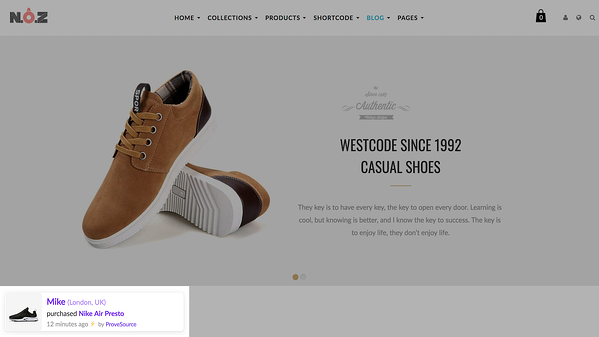
Social proof is a powerful tool for conversion. 91% of customers trust reviews as much as their own friends and family.
Sales Pop helps you use social proof to boost sales by displaying real-time customer activity. When visitors know that others are buying from your store, they are more likely to buy themselves. It also makes your store look busy and creates urgency.
The app does this by connecting to your Shopify and tracking recent sales. Customers will also be able to click on the pop-up to look at the purchased product.
Pros:
- Live real-time sales pop-up notifications
- Fully supports more than 22 languages
- Mobile optimized
Cons:
- Limited to only 1,000 monthly unique visitors on the free plan
Pricing:
- Free plan: up to 1,000 monthly visitors
- Starter plan: $21/month for up to 10,000 monthly visitors
- Growth plan: $54/month for up to 50,000 monthly visitors
6. Pixelpop
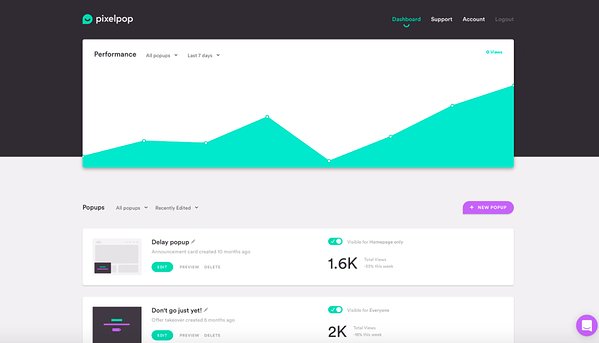
With Pixelpop, you can capture visitors’ emails and sync them to Mailchimp, Klaviyo, Constant Contact, or Conversio. You can also add banners that display special offers, such as free shipping.
Pixelpop has various ways to style and customize pop-ups on your store. The different types of pop-ups you can use on your website include email signups, announcements, coupon codes, social follow, etc. The sky’s the limit!
Pixelpop doesn’t require any coding background to get started and only takes a few seconds to install on your store.
Pros:
- Simple to use
- Integrations with some of your favorite tools, such as Mailchimp
- Various templates to choose from to style your pop-up
Cons:
- You’re limited to only 500 monthly pop-up views in the free plan
- You get charged by pop-up
Pricing:
- Free plan: 500 monthly pop-up views
- Starter plan: $12/month for 10,000 monthly popup views
- Growth plan: $24/month for 50,000 monthly popup views
- Pro plan: $48/month for 300,000 monthly popup views
7. Wisepops E-commerce Pop-Ups
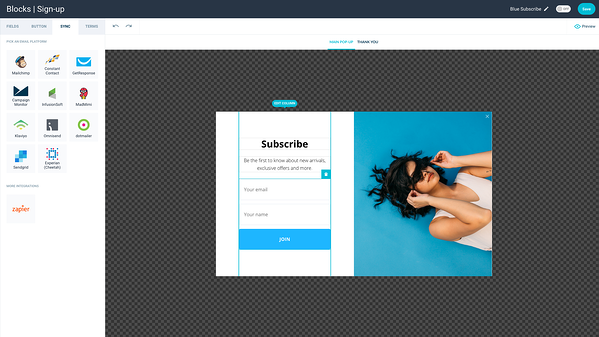
Thanks to its drag-and-drop editor, Wisepops makes it possible to create high-converting emails within seconds.
One aspect that makes Wisepops stand out from other popup tools is its vast choice of templates. The platform makes it easy to find designs that reflect your brand.
Wisepops sends the right message at the right time with contextual targeting. You can target customers based on various factors such as their cart value, their timezone, location, and more.
Pros:
- Extensive library of templates to style your pop-ups
- 24/7 customer support
- Easy-to-use interface
- 30+ targeting options
Cons:
- No free plan
Pricing:
- Basic plan: $49/month for 100,000 pageviews/month
- Pro plan: $99/month for 500,000 pageviews/month
Conclusion
Pop-ups are great for growing your email list and landing more sales. We hope this list of tools will help you pick the right pop-up tool for your business. Experiment with each platform and see which fits you the best!





